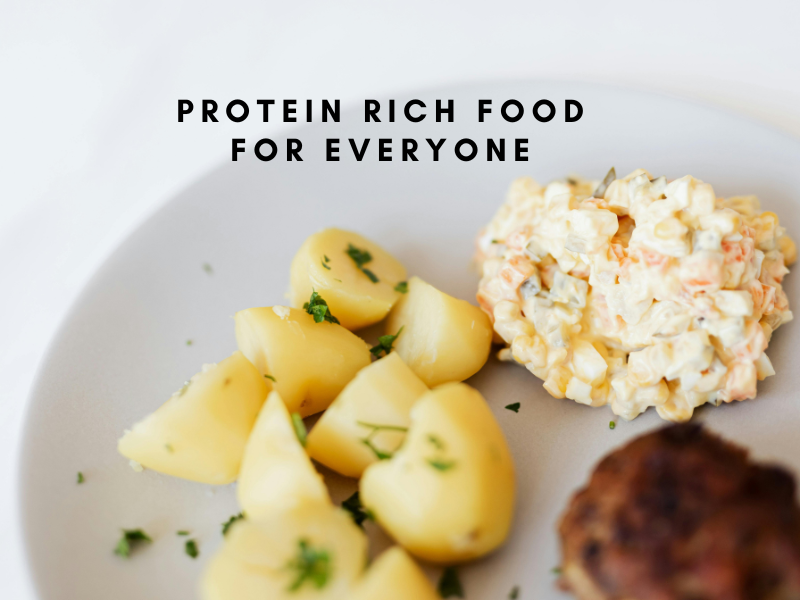What is Protein?
Proteins are complex molecules made up of amino acids, which are often described as the building blocks of life. They are essential macronutrients that play a fundamental role in nearly all biological processes in the body. Proteins are vital macronutrients that are necessary for the structure, function, and regulation of the body's cells and tissues. They play a crucial role in various biological processes, and consuming adequate amounts of protein is essential for overall health and well-being.
Why Protein is Important for Body?
Protein is crucial for the body as it plays a vital role in building and repairing tissues, making enzymes and hormones, and supporting immune function. It's essential for everyone, not just bodybuilders or athletes. Many hormones are made of proteins or require proteins for their synthesis. Hormones regulate various body functions, including metabolism, growth, and mood. Protein is the building block of muscles. When you exercise, especially strength training, you create micro-tears in your muscles. Protein helps repair these tears, leading to muscle growth and recovery.
Antibodies, which are critical for fighting infections, are proteins. Protein deficiency can weaken the immune system, making you more susceptible to illnesses. Protein-rich foods tend to be more filling than foods high in carbs or fats. Including protein in your meals can help you feel satisfied and may aid in weight management by reducing overall calorie intake. The amount of protein you need depends on various factors such as age, sex, weight, and activity level. Generally, the Recommended Dietary Allowance (RDA) for protein is 0.8 grams per kilogram of body weight for adults. However, athletes and those engaged in intense physical activity may need more.
Here are some vegetarian protein-rich foods:
-
Legumes:
- Lentils
- Chickpeas (garbanzo beans)
- Black beans
- Kidney beans
- Soybeans
-
Tofu and Tempeh:
-
Edamame:
- Young soybeans, often eaten as a snack or added to salads
-
Quinoa:
- A pseudo-grain that is a complete protein, containing all nine essential amino acids
-
Seitan:
- Made from gluten (wheat protein), it's often used as a meat substitute
 Buy now:- Nazar Mug
Buy now:- Nazar Mug
- Made from gluten (wheat protein), it's often used as a meat substitute
6. Nuts and Seeds:
- Almonds
- Walnuts
- Pistachios
- Cashews
- Pumpkin seeds
- Sunflower seeds
7. Nut Butters:
- Peanut butter
- Almond butter
- Cashew butter
8. Chia Seeds and Flaxseeds:
- High in protein and omega-3 fatty acids
 Buy now:- Ele Mug
Buy now:- Ele Mug
- Brown rice
- Quinoa
- Barley
- Oats
- Buckwheat
10. Dairy and Dairy Alternatives:
- Greek yogurt
- Cottage cheese
- Milk (including almond, soy, or oat milk)
- Cheese (such as cheddar, mozzarella, or feta)
11. Leafy Greens:
- Spinach
- Kale
- Collard greens
12. Spirulina and Chlorella:
- These are types of algae that are high in protein and various nutrients
 Buy now:- Kitty Planter
Buy now:- Kitty Planter
13. Vegetarian Meat Substitutes:
- Veggie burgers
- Veggie sausages
- Meatless meatballs
- Plant-based chicken strips
Here are some protein-rich foods for non-vegetarians:
-
Poultry:
- Chicken breast (skinless)
- Turkey breast (skinless)
- Duck breast
- Quail
- Goose
-
Red Meat:
- Lean beef (such as sirloin, tenderloin, or flank steak)
- Lamb chops
- Venison (deer meat)
- Bison
-
Fish:
- Salmon
- Tuna
- Trout
- Cod
- Halibut
- Mackerel
- Sardines
- Haddock
-
Seafood:
- Shrimp
- Crab
- Lobster
- Mussels
- Clams
- Oysters
- Scallops

Buy now:- Dog Mug
5. Eggs:
- Eggs are a complete protein source, containing all essential amino acids.
6. Dairy:
- Greek yogurt
- Cottage cheese
- Milk (including cow's milk)
- Cheese (such as cheddar, mozzarella, or Swiss)
7. Processed Meats (Use in moderation)
- Lean deli meats (turkey, chicken)
- Beef jerky
- Sausages (choose lean varieties)
 Buy now: Daisy Bloom Mug
Buy now: Daisy Bloom Mug
8. Game Meat:
- Elk
- Wild boar
- Rabbit
- Pheasant
- Venison
9. Bone Broth:
- Provides protein from animal bones and connective tissue
These foods are excellent sources of high-quality protein and can be incorporated into a balanced diet for optimal health and nutrition.
Conclusion:-
In conclusion, protein-rich foods are essential for building and repairing tissues, producing hormones, supporting immune function, and providing a feeling of satiety. They are vital for everyone, regardless of dietary preferences.
For vegetarians, protein-rich options include legumes, tofu, tempeh, quinoa, nuts, seeds, dairy, and plant-based meat substitutes. Non-vegetarians can choose from a variety of animal-based sources such as poultry, red meat, fish, seafood, eggs, and dairy. Incorporating a diverse range of protein-rich foods into your diet ensures that you receive all essential amino acids and other nutrients necessary for overall health and well-being.




